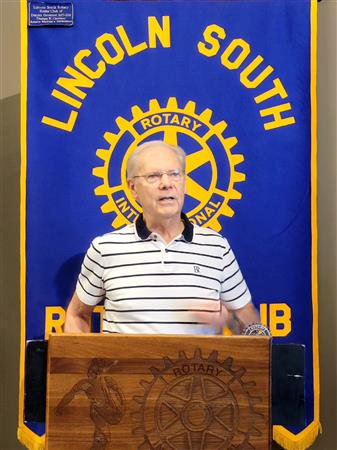
On July 15 at Lincoln South Rotary Club, we heard from Dr. Don Wilhite Professor Emeritus UNL who is a Climatologist & Drought Management specialist.
Dr. Wilhite started by stating that people sometimes confuse weather with climate. The difference is fairly simple - while weather refers to the current conditions, climate is the weather of a specific region averaged over a long period of time.
He also discussed the term global warming vs. climate change. He prefers climate change because it is not just an increase in temperatures, it is a change in the heat index. The heat index is affected by the humidity level. For every degree the temperature increases, the capacity for the atmosphere to hold moisture is increased 4%.
Some have stated that the heat increased because the energy from the sun has increased. But Dr. Wilhite said that studies indicate that is not the case - but the temperatures are still going up. So rather than it being a natural force - it is a human force that has caused the change.
He explained the impact of greenhouse gasses on the atmosphere - how they attribute to more moisture in the air - therefore a higher heat index.
He commented that Action Leads To Hope - we have to have hope but without action to reduce the global warming, where will we find that hope? He stated that the projection is that, by 2071-2099 the temperatures will increase by 4-5 degrees if we do not make any changes. However it could be as much as an increase by 8-9 degrees due to uncertainties of future emissions.
The topic of climate change has become very politicized. It is difficult to discuss.
He said that there have been some studies on the impacts of Climate Change but, in one case, they only wanted to include natural changes. Without the human-induced impacts we do not get a full picture.
He talked about adaptation. He said that farmers adapt regularly with weather changes. They have adjusted planting seasons and the types of plantings. However, with climate changing continuing at the current projections, it will be difficult for farming to adapt enough to ensure that they can produce food for our world.
What is at risk in Nebraska - everything - "The Good Life".
Agriculture - crops, livestock, ground water
Ecosystems - increased competition for water, loss of biodiversity
Public Health - respiratory illness, heat-related deaths
Energy - increase demand and cost
Rural Communities - people moving away, diminished water supply
Urban Infrastructure - water supply, heat island effect due to structures and roads absorbing and remitting sun's heat
For contact information for Dr. Don Wilhite, click here.